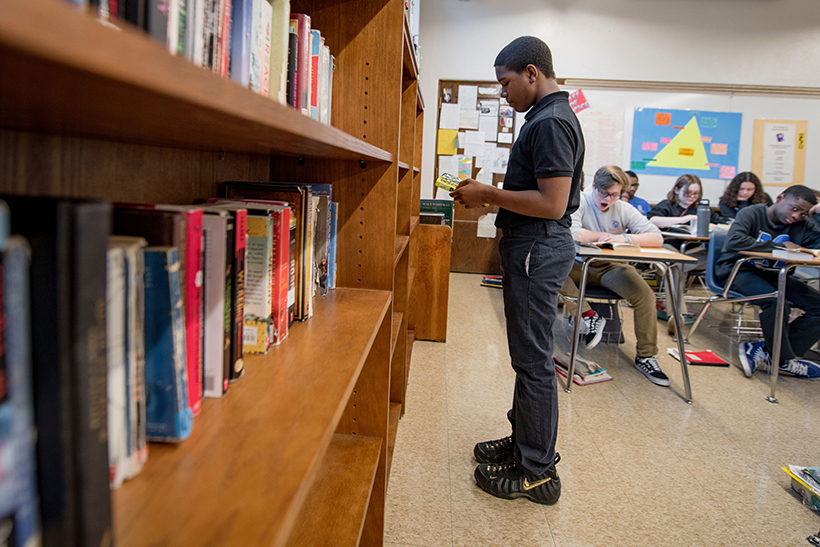This blog post was written by NCTE member Luke Schlueter.
There are many ways to describe what makes us human. We are the creatures who use language; we are driven by curiosity to explore, and by creativity to create and invent; we think about life, death, where we came from, and whether there is something that comes next. One definition offers a particularly rich vein of reflection: we tell stories, and we order our lives by the stories we tell. And never is storytelling more important than when trying to understand and work through the unique challenges and difficulties we all occasionally face.
Stories, after all, are the most basic means we have of making sense of ourselves and our lives. And when a narrative, a stable sense of meaning, however much or little we had thought about it beforehand, is disrupted, the human instinct is to turn to narratives that will help to explain, console, and in some manner heal.
Never is this more clear than when thinking about this past year. There is no person who has not been touched by some type of loss during the COVID-19 pandemic, whether it be economic loss, the loss of a loved one, or the loss of all the time that we might have spent with people we love, doing the things we love doing.
For many children and young adults, the loss of the physical classroom and the experience of learning alongside peers in the scrum of a physical space has had dramatic consequences for learning and for mental health. As we slowly begin to return to those lives that had been so abruptly pulled out from under us, there is a call for teachers and schools to provide their students with the opportunity to engage with stories that will help them to work through what they have experienced and to think anew what this busines of being a human being is all about.
To embrace this opportunity means recognizing, to begin with, the pleasures of storytelling and the central place storytelling has in our lives.
As far as the pleasures of storytelling go, there is nothing in human experience that compares to the wonder of being so swept up in the world of a novel that you leave yourself and your own world momentarily behind. But good novels don’t stop there. They lead us, at the same time, to reconsider the shape and purpose of our own lives in the light of the characters we read about, and this happens regardless of how dissimilar the outward features of those characters’ lives are from our own.
There aren’t any readers, after all, who will know what it’s like to be a cricket living in a subway station, but they will immediately be absorbed from the first page of A Cricket In Times Square in the story of Chester, a cricket from the Connecticut countryside who finds himself in just such a place.
There are few young readers, likewise, who will know what it is like to live in the backwoods of the Ozarks, but they will immediately recognize the passion that prompts Billy Colman, the hero of Where the Red Fern Grows, to devote a year of his life to saving up money to purchase a pair of hounds for hunting racoons.
More readers may relate to the situation of Ghost, the hero of Jason Reynold’s wonderful novel, who discovers a surprising sense of fellowship with a misfit band of track runners, but even readers who haven’t had such an experience will immediately sympathize with the pain and confusion Ghost feels over the betrayal of a parent.
We read stories because they allow us to experience other lives and other places, and if that were the only reason that would be good enough. But there is one other reason, and one that is perhaps the most important reason of all—they help us to reimagine our own lives, and in that act of imagination we are given the opportunity to reflect upon where we’ve been, where we are, and where we are going.
All of this happens at some level when we read a good story, but there a few ways of making sure that every young reader has this experience and in the most meaningful way possible.
Teachers, to begin with, can ensure that students read novels that have the power to draw students into their world and hold them there. Not all novels are equal; certain novels, through some magical mixture of plot, character, and language, are uniquely able to give the students the kind of transformative experience that we look for in stories, and teachers should prioritize the novels that do just that.
Second, teachers can give students the opportunity to share their own experience of reading a novel with their peers. There are few things more enjoyable, after all, than the shared experience of reading and discussing a novel with others who have been equally moved by it and have interesting things to say about.
Third, teachers can give students opportunities for making connections between their own lives and the lives of the characters they read about.
As students begin to return to physical classrooms, they will be hungry for the kind of experience that lies at the very heart of storytelling—the opportunity to tell their own stories, to hear the stories of others, and to find meaning and consolation in novels that appeal to their hearts and minds. Although reading stories is a deeply personal experience, it can also be a richly communal one, and schools that carve out space for this experience will be giving their students a gift that will reap benefits in their immediate lives and for those new lives that they are only now starting to imagine.
 Luke Schlueter is an associate professor of English at Cuyahoga Community College in Cleveland, Ohio, and a principal author of Inspiring Readers, a whole-class, whole-novel literature program for schools. Find Luke on LinkedIn at www.linkedin.com/in/
Luke Schlueter is an associate professor of English at Cuyahoga Community College in Cleveland, Ohio, and a principal author of Inspiring Readers, a whole-class, whole-novel literature program for schools. Find Luke on LinkedIn at www.linkedin.com/in/
It is the policy of NCTE in all publications, including the Literacy & NCTE blog, to provide a forum for the open discussion of ideas concerning the content and the teaching of English and the language arts. Publicity accorded to any particular point of view does not imply endorsement by the Executive Committee, the Board of Directors, the staff, or the membership at large, except in announcements of policy, where such endorsement is clearly specified.

